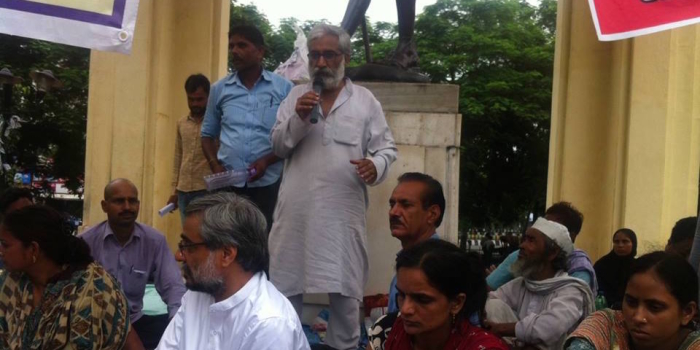by Sandeep Pandey
One of the election promises of Narendra Modi was to roll back the price-rise. But exact opposite is happening in reality. For instance, within past 4 months the cost of ‘arhar daal’ has doubled from Rs 100 to Rs 200 per kg. Daily wagers are struggling to make both ends meet and earn enough to bear the cost of daal, primary source of protein, in daily diet of their family. Former PM Manmohan Singh while releasing a report in January 2012 had said that it is a matter of national shame that half of our children are malnourished. Another national shame for India according to Richard Horton, the editor-in-chief of ‘The Lancet’ medical journal is about 6 lakh deaths of children under five every year due to unsatisfactory mother and child care. It is more than double the combined number of people who died in atomic bombing of Hiroshima and Nagasaki in 1945 by the US. Horton describes health as an issue of national security for India. With inability to feed protein-rich daal, there is a big risk of these malnourished children slipping into a condition of hunger. A poor person can’t even have roti with onion as cost of onion has doubled from Rs 30-35 per kg to Rs 60 per kg during the past 4 months. Likewise cost of most vegetables has doubled over the last one year. It appears as if government has hit upon a simple solution to ending poverty – eliminate the poor! Health care is simply not on Modi’s agenda. And it appears now that neither are the prices of essential food commodities.
Despite the fact how steep price-rise is making life difficult for a majority of our people, this issue has not become a political one. Not even in Bihar elections where majority of population survives in a daily struggle against poverty. To divert people’s attention from this serious issue, events like the Dadri killing take place so that common people remain engaged in debates around cow meat. Incidentally, meat is less expensive than daal now. The Hindutva brigade is not even questioning that with prices of items, which are integral part of Indian vegetarian diet, almost doubled how are vegetarians expected to survive? The Hindutva activists have been known for raising only those issues on which ordinary people’s sentiments can be exploited, completely ignoring real issues which impact the lives of poor.
The plight of farmers is unbearable. Farmers are not even getting minimum support prices for their crops due to complete takeover of procurement by middle-men and associated corruption. To make matters worse, vagaries of the nature, due to which farmers’ crops were destroyed, have made it difficult for the farmers to feed their families as well as repay the loans which they took for carrying out agricultural activities. Government has failed to provide adequate compensation to all the farmers who faced loss of crop yield or to families of those who committed suicide. It appears that Insurance companies have no role to play. They are not in the picture at all. The pertinent question is, what do these companies insure farmers against? This is a strange paradox that on one hand farmers are failing to get their fair dues for crop, and on another hand, prices of their farm produce are shooting up astronomically for common consumers! It is an open secret that business community is a strong support base for the BJP. Hence the middle-men have benefitted immensely since the arrival of achche din at the cost of farmers, agricultural labourers and consumers.
This is now confirmed as the Finance Minister Arun Jaitley and consumer affairs ministry revealed that roughly 75,000 tons of pulses were seized from hoarders in Maharashtra, Karnataka, Bihar, Chhattisgarh, Telangana, Madhya Pradesh, Rajasthan, Haryana, Andhra Pradesh, Tamil Nadu and Himachal Pradesh, in descending order of quantity recovered. Maharashtra alone was responsible for hoarding of over 45,000 tons. It is interesting to observe that bulk of the hoarding is in BJP or NDA ruled states. This clearly implies that traders in BJP or NDA ruled states felt safe to hoard as they thought they would be able to get away with it. Considering that the government has so far imported 5,000 tons of pulses, the amount recovered from within the country, and possibly there is more to be seized, is ten times the quantity which is expected to lower the prices. Hence, if the government was strict with traders to begin with such a situation would never have arisen in the first place.
Although the government is trying to control the prices, for example, by selling arhar daal at Rs. 120 per kg from 500 outlets of Kendriya Bhandar and Safal in Delhi, it seldom happens that once the prices rise they return to their value prior to the crisis. So, the trader community stands to gain from this situation over all. Narendra Modi has certainly duped the common people with his slogan of achche din.













